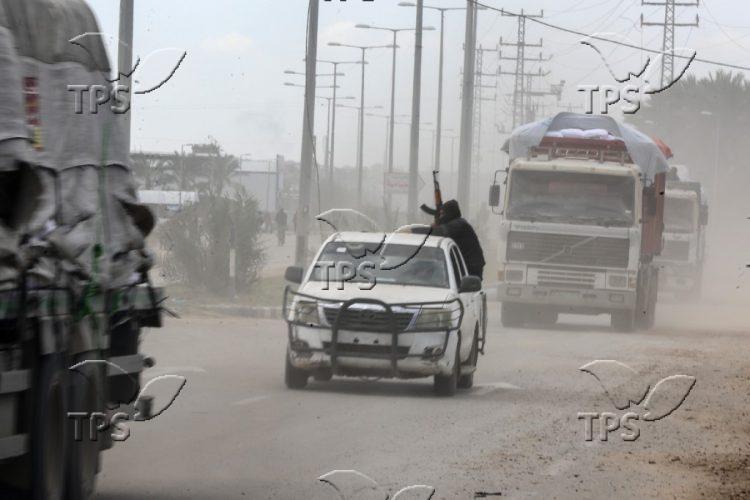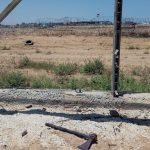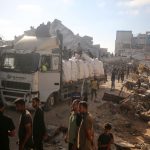Palestinians Pay $800 for ‘Donated’ Tents: How Hamas Uses Humanitarian Aid to Fund its War on Israel
Jerusalem, 15 September, 2024 (TPS-IL) -- Despite Gaza’s widespread devastation, Hamas continues paying salaries to its gunmen and civil servants partly through taxing and diverting humanitarian aid and distributing food vouchers — with the help of clans, criminal groups and so-called “People’s Committees.”
An Israeli security official told The Press Service of Israel, “Hamas’ governance situation in the northern Gaza Strip is suffering from progressive necrosis,” adding that humanitarian aid appears to be “intensive treatment” for the terror group. This perspective highlights the complexity of the situation in Gaza, where aid intended to alleviate the suffering of civilians is instead helping to sustain Hamas’s grip on power.
Last week, Hamas managed to pay full salaries to its fighters and partial salaries to thousands of its 27,000 civil servants, TPS-IL has learned. This was done despite the heavy financial burden it places on the terror group, highlighting its determination to maintain its grip on Gaza.
However, the continued financing of its war with Israel has raised concerns about the sources of this funding. Reports indicate that Hamas uses a variety of methods to gather revenue, including the imposition of “transit taxes” on aid trucks carrying food, water, medicine and tents, blankets and other goods into the Strip.
According to testimonies, Hamas operatives in civilian clothes set up surprise checkpoints along key routes leading from the border crossings into Gaza. At these roadblocks, truck drivers are forced to pay hefty sums ranging from 50,000-100,000 shekels ($13,400-$27,000) or relinquish up to 50 percent of their cargo’s contents.
In one reported instance, Hamas members seized 200 gas cylinders from a single truck, leaving only a small number behind — a profit of tens of thousands of dollars for the terror group.
Charging $800 for ‘Donated’ Tents
Beyond direct taxation, Hamas has been accused of confiscating humanitarian aid. Testimonies reveal that Hamas operates through a network of local clans and gangs who control main roads and intercept aid shipments. They then transfer this aid to Hamas warehouses, essentially creating a parallel economy. In return for their cooperation, these gangs receive monthly payments, reportedly around $10,000, ensuring a steady flow of goods to Hamas-controlled areas, including its tunnel network.
This diversion extends to shelter and food aid as well. Tents sent from Arab countries intended to provide shelter for displaced Palestinians are reportedly being sold by Hamas at a cost of around 3,000 shekels ($800) per family. Food supplies, which include essentials delivered by trucks from various international donors, are looted and sold at inflated prices, sometimes 20 to 30 times their original cost. One report mentions that the price of a pack of cigarettes has soared to an astonishing $1,200.
Hamas distributes food vouchers and coupons primarily through mosques under its supervision. According to several accounts, these distributions are carefully managed to benefit Hamas loyalists and their families. To enforce this system, Hamas deploys secret police units in shelters for displaced persons, ensuring that food and aid supplies are not accessed by unauthorized individuals.
Hamas’s methods for maintaining control over aid distribution are reported to include severe punitive measures against those who attempt to bypass their control. Witnesses recount incidents in which residents caught with stolen goods were either killed or publicly humiliated. For incident, Hamas hung a resident of the Nuseirat refugee camp for allegedly stealing food.
In another layer of control over humanitarian aid, Hamas receives support from organizations known as the “People’s Committees” or the “Emergency Committees.” These groups, comprising local clans, have agreements with Hamas allowing them to keep a portion of the aid arriving in Gaza while transferring the rest to Hamas.
“We didn’t know from the beginning to what extent the treatment of the humanitarian issue is a decisive element in the management of the war,” a senior Israeli political official told TPS-IL.
At least 1,200 people were killed, and 252 Israelis and foreigners were taken hostage in Hamas’s attacks on Israeli communities near the Gaza border on October 7. Of the 97 remaining hostages, more than 30 have been declared dead. Hamas has also been holding captive two Israeli civilians since 2014 and 2015, and the bodies of two soldiers killed in 2014.







